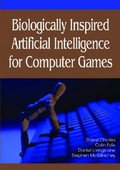| Меню сайта |
| Наше опитування |
| Реклама від Google |
|
Главная » 2009 Лютий 27 » Biologically Inspired Artificial Intelligence for Computer Games [en]
Biologically Inspired Artificial Intelligence for Computer Games [en] | 20:42 |
 Hardcover: 278 pages Доступно тільки для користувачів
Publisher: IGI Publishing (December 3, 2007) Language: English ISBN-10: 1591406463 ISBN-13: 978-1591406464 Computer games are often played by a human player against an artificial intelligence software entity. In order to truly respond in a human-like manner, the artificia intelligence in games must be adaptive, or respond as a human player would as he/she learns to play a game. Biologically Inspired Artificial Intelligence for Computer Games reviews several strands of modern artificial intelligence, including supervised and unsupervised artificial neural networks; evolutionary algorithms; artificial immune systems, swarms, and shows using case studies for each to display how they may be applied to computer games. This book spans the divide which currently exists between the academic research community working with advanced artificial intelligence techniques and the games programming community which must create and release new, robust, and interesting games on strict deadlines, thereby creating an invaluable collection supporting both technological research and the gaming industry. About the Author Darryl Charles graduated from Queens University Belfast with a degree in Electrical and Electronic Engineering (Hons.) in 1988. After qualifying as a teacher at Stranmillis College, Belfast, he taught Technology and Design at Portadown College until 1995 and during this spell completed an MSc in Microelectronics and Microcomputer Applications. He then spent a year as Head of IT at Cox Green School in Maidenhead before going back into higher education to study for a PhD at the University of Paisley, Scotland. After completing a PhD in Unsupervised Neural Networks in 1999 he was appointed as a lecturer then as a senior lecturer in Computing at Paisley. In 2001 he returned to Northern Ireland to take up a lecturing post at the University of Ulster where his teaching and research specialism is now within the realm of computer games and in particular adaptation. Professor Colin Fyfe is an active researcher in Artificial Neural Networks, Genetic Algorithms, Artificial Immune Systems and Artificial Life having written over 250 refereed papers, several book chapters and two books. He is a member of the Editorial Board of the International Journal of Knowledge-Based Intelligent Engineering Systems and an Associate Editor of International Journal of Neural Systems. He currently supervises 6 PhD students and has been Director of Studies for 16 PhDs since 1998. He is a member of the Academic Advisory Board of the International Computer Science Conventions group and a Committee member of the European Network of Excellence on Intelligent Technologies for Smart Adaptive Systems (EUNITE). He has been Visiting Researcher at the University of Strathclyde, the Riken Institute in Tokyo, the Chinese University of Hong Kong, and Visiting Professor at the University of Vigo, the University of Burgos, and the University of Salamanca, all in Spain. Daniel Livingstone received a BSc (Hons) in Computer & Electronic Engineering from the University of Strathclyde in 1993, an MSc with Distinction in Computer Science (AI) from the University of Essex in 1995 and a PhD (modelling the evolution of human language and languages) from the University of Paisley in 2003. He currently lectures a range of classes related to computer game development, and his research interests range from AI and Artificial Life for computer games to the use of game technology in education. His current work is now focussing on the use of massively-multiplayer virtual worlds as learning platforms. Stephen McGlinchey received the BSc (Hons) degree in Computing Science from the University of Paisley in 1996, and went on to do a PhD in Neural Networks, which was completed in 2000, also at Paisley. He now works as a lecturer at the University of Paisley, teaching computer games technology. He has published several research papers, mainly on neural networks and artificial intelligence for games. Recently, his research work has focussed on ant colony algorithms for path-finding in computer games, and automatic post-processing of motion capture data. | |
| Категория: AI | Просмотров: 892 | Добавил: Admin | Рейтинг: 0.0/0 | | |
| Всего комментариев: 0 | |
| Форма входа |
| Календар новин | ||||||||||||||||||||||||||||||||||||||||||||||||
| ||||||||||||||||||||||||||||||||||||||||||||||||
| Пошук |
|
|
| Статистика |
Онлайн всього 1 Гостей 1 Користувачів 0 |